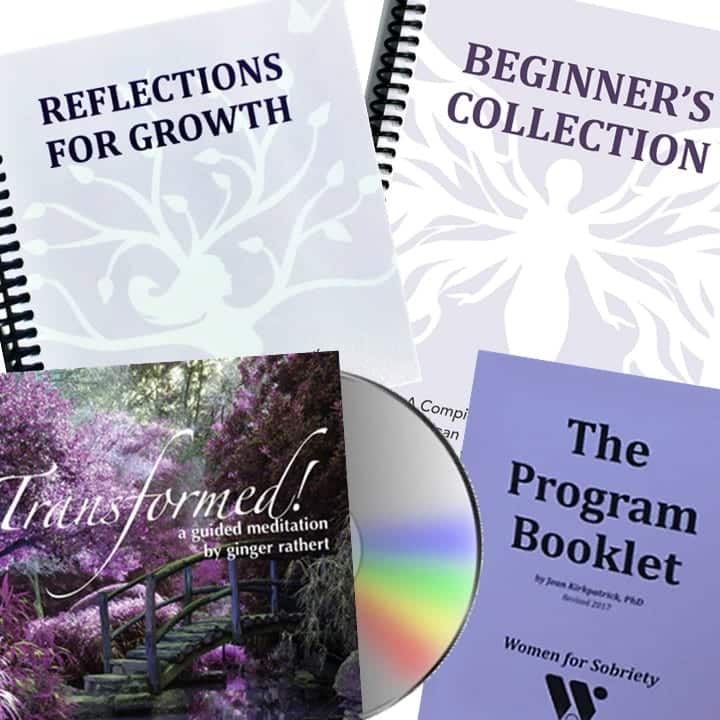Your cart is currently empty!
New Life Program
Overview
Experiencing a life-threatening problem with alcohol or another drug is not a moral weakness. It is a serious disorder that demands rigorous attention to healing. Founded by a sociologist who believed that women face unique challenges in overcoming addiction, the WFS New Life Program is specifically designed to help women overcome guilt, depression and low self-esteem for which substances have become the primary coping mechanism.
To overcome substance use disorders (SUDs), women must address their real needs — those for an increased understanding of self-value, self-worth and self-efficacy. Women learn how to overcome their problematic substance use with peer support and by adopting a new way of thinking based on the 13 Acceptance Statements.
The Program
By Jean Kirkpatrick, Ph.D. (lightly revised from original publication in 1977)
What is meant by “The Program”? How do we view it? How is it to be used?
The Women for Sobriety New Life Program is comprised of thirteen Acceptance Statements that, when internalized and used, will provide each woman with a new way of life through a new way of thinking.
As women with addictions, we must learn about ourselves and how to avoid the pitfalls of faulty thinking and destructive behavior that used to lead us to taking that first drink or drug, even though we sometimes did not want to.
Since we had a faulty approach to life and living, we must turn our attention to finding new ways of overcoming. This starts with coping first but then moving on to overcoming and a whole change in our approach to each day.
To make the program effective for you, arise each morning fifteen minutes earlier than usual and go over the thirteen Acceptance Statements. Then begin to think about each one by itself. Take one statement and use it consciously all day. At the end of the day, just before sleeping, review the use of it and what affects it had that day for you and your actions. For some, it has proven helpful to use a notebook for recording the sequences of the day and the statement’s effects upon you.
A Program Booklet with short essays on each Statement and our Beginner’s Special are available and can be quite helpful to those new in the program
To make the program effective for you, it must be consciously used each day. Never forget that our faulty thinking is a result of many years. It cannot be corrected overnight. It takes a long time to realize that most of what we thought was cast in a negative view.
The philosophy of the Women for Sobriety New Life Program is that the image precedes our actions. Whatever we think, we eventually act out. If our thoughts are always negative, our actions will also be negative. If our thoughts are positive, so are our actions. One writer once said a garden of weeds cannot produce a beautiful flower. This is also true of our minds. If we have upsetting thoughts, we cannot have a serene life.
We used to think that life was upsetting and our problems followed but it is usually the other way around. Our thoughts were confused and negative, and life’s actions came to be that way also. We create our own world. No one else does. We are responsible for ourselves and our choices. What we are, we made ourselves become.
We have the power of changing our way of thinking. We live in the atmosphere created by our mind and our thoughts.

We are now beginning to create a new woman, the woman we always wanted to be but never thought possible. The Women for Sobriety New Life Program helps you to change your thinking and shows you how to be the dynamic woman you have the capability of becoming. We begin by being in charge of our actions through our thoughts. We no longer react but, now, begin to act the way we want to act. We end game playing. We become our whole person by learning independent thinking.
Negative thoughts, so much a part of the life of women in active addiction, are often carried into sobriety. These negative thoughts frequently make the sober woman unhappy and depressed. She begins to wonder if sobriety is really worth it.
We used substances to cover pain, emotional pain. When we remove the substances, we must then learn a way to remove the emotional pain, which requires a new way of thinking about life.
Our program makes sobriety a happy existence by helping us to understand ourselves better. Our sobriety is more than simply a period of time in which we are not drinking; it becomes a happy learning experience.
Learn to know yourself and your addiction. This is how to overcome.
